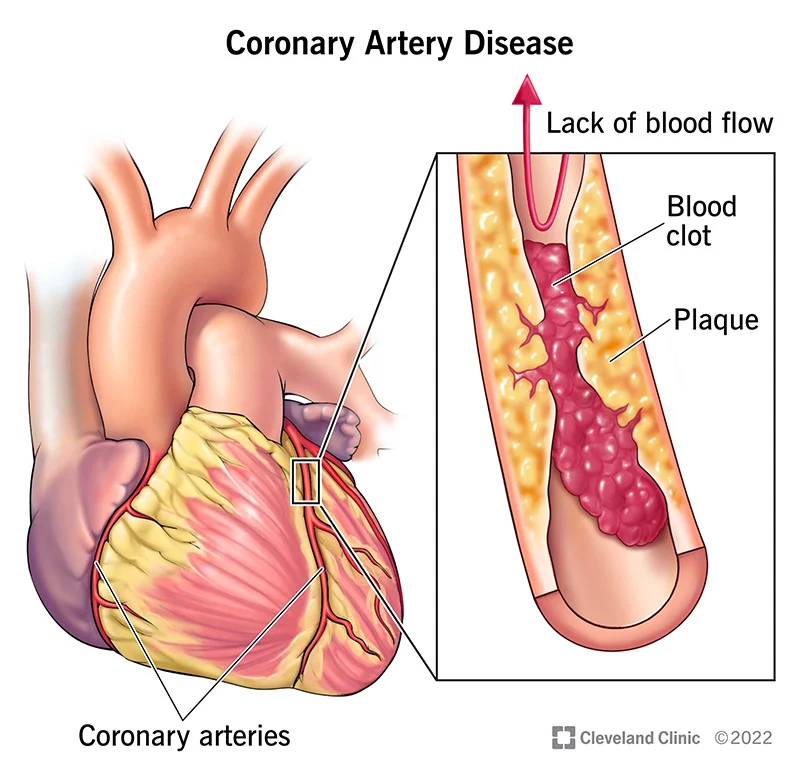Coronary Artery Narrowing

Introduction
Coronary artery narrowing, also known as coronary artery stenosis, is a medical condition where the arteries that supply blood and oxygen to the heart muscle become narrowed or constricted. This condition can impede blood flow to the heart, potentially leading to various heart-related problems. In this article, we delve into coronary artery narrowing, its causes, symptoms, diagnosis, treatment options, and the importance of early intervention.
Understanding Coronary Artery Narrowing
Coronary artery narrowing occurs when fatty deposits, cholesterol, calcium, and other substances accumulate on the inner walls of the coronary arteries, forming plaques. These plaques can gradually reduce the inner diameter of the arteries, restricting blood flow to the heart. This diminished blood supply can result in chest pain (angina), heart attacks, and other cardiac complications.
Causes and Risk Factors
Several factors contribute to the development of coronary artery narrowing, including:
- Atherosclerosis: The primary cause, where plaque buildup occurs over time.
- High Blood Pressure: Hypertension can accelerate the hardening and narrowing of arteries.
- High Cholesterol: Elevated levels of LDL (low-density lipoprotein) cholesterol are associated with increased plaque formation.
- Diabetes: Poorly managed diabetes can damage blood vessels and promote plaque buildup.
- Smoking: Smoking accelerates atherosclerosis and increases the risk of plaque rupture.
- Family History: A genetic predisposition to heart disease can contribute.
- Obesity: Excess body weight increases the risk of developing coronary artery narrowing.
Symptoms
Coronary artery narrowing may not produce noticeable symptoms until it progresses significantly. Common symptoms include:
- Angina: Chest pain or discomfort, often triggered by physical exertion or emotional stress.
- Shortness of Breath: Especially during activity or when lying flat.
- Fatigue: Unexplained tiredness and reduced exercise tolerance.
- Heart Attack: A sudden, severe chest pain that may radiate to the arms, neck, or jaw.
Diagnosis
Diagnosing coronary artery narrowing involves a combination of medical evaluations and tests, including:
- Cardiac Catheterization (Angiography): A procedure that involves injecting contrast dye into the coronary arteries to visualize blockages and assess blood flow.
- Electrocardiogram (ECG or EKG): To detect abnormal heart rhythms or signs of heart damage.
- Stress Testing: Evaluates how well the heart functions under stress, such as during exercise or medication-induced stress.
- CT or MRI Angiography: Non-invasive imaging techniques that can provide detailed views of the coronary arteries.
Treatment Options
The treatment approach for coronary artery narrowing aims to relieve symptoms, improve blood flow, and reduce the risk of complications. Treatment options may include:
- Medications: Statins to lower cholesterol, antiplatelet drugs, and blood pressure medications.
- Lifestyle Modifications: Dietary changes, regular exercise, smoking cessation, and weight management.
- Angioplasty and Stent Placement: A minimally invasive procedure to open narrowed arteries and place stents to keep them open.
- Coronary Artery Bypass Grafting (CABG): In cases of severe narrowing, surgical rerouting of blood flow around blocked arteries may be necessary.
Importance of Early Intervention
Early diagnosis and treatment of coronary artery narrowing are crucial to prevent heart attacks, relieve symptoms, and improve overall heart health. Lifestyle changes and adherence to prescribed medications can significantly reduce the risk of complications associated with this condition.
Conclusion
Coronary artery narrowing is a common cardiovascular condition that can have serious consequences if left untreated. Awareness of risk factors, regular health check-ups, and early intervention are key to managing this condition effectively. Maintaining a healthy heart through a balanced lifestyle and medical care is vital to ensure a long and fulfilling life free from the constraints of coronary artery narrowing.
